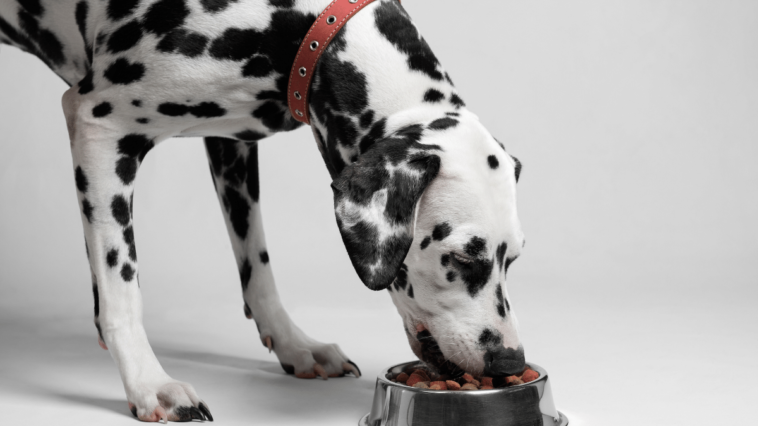As a dog owner, you may be curious about what types of human food are safe and healthy for your furry friend. One common question often arises is whether or not dogs can eat potatoes.
Potatoes are a staple food in many households and can be a healthy source of vitamins, mineral, and fiber for humans. However, when it comes to dogs, it’s essential to understand the potential risks and benefits of feeding potatoes.
In this post, we will explore the nutritional value of potatoes for dogs, the risks of feeding potatoes to dogs, the different forms of potatoes and their impact on dogs, the signs of potato allergy in dogs, and safe ways to feed potatoes to your dog. By the end of this post, you will better understand whether potatoes are suitable food for your canine companion.
The Nutritional Value of Potatoes for Dogs
Potatoes are a common staple food in many households and are often included in a dog’s diet. However, before feeding your dog potatoes, it’s essential to understand the nutritional value of this vegetable for your furry friend.
Potatoes are a rich source of carbohydrates, essential for providing energy to your dog’s body. They also contain various vitamins and minerals, including vitamin C, B6, potassium, and iron. Potatoes are also a good source of dietary fiber, aiding digestion and regulating bowel movements.
However, it’s important to note that potatoes are also high in starch, which can lead to weight gain if fed in excess. Additionally, some dogs may have difficulty digesting potatoes, especially if they have a history of digestive issues or food allergies.
When feeding your dog potatoes, it’s important to do so in moderation and as part of a balanced diet. Raw potatoes should be avoided as they can be difficult for dogs to digest and contain harmful solanine, which can cause vomiting, diarrhea, and other digestive issues.
If you feed your dog potatoes, it’s best to serve them cooked, mashed, or pureed. Mix them with other dog-friendly vegetables and proteins to create a balanced and nutritious meal.
Overall, while potatoes can be a healthy addition to your dog’s diet when fed in moderation, it’s important to be aware of the potential risks and to consult with your veterinarian before making any major changes to your dog’s diet.
Risks of Feeding Potatoes to Dogs
While potatoes can be a healthy addition to a dog’s diet when fed in moderation, some potential risks are associated with feeding this starchy vegetable to dogs.
- Digestive issues: Some dogs may have difficulty digesting potatoes, especially if they have digestive issues or food allergies. Feeding too many potatoes or feeding them in an uncooked or unripe form can lead to digestive issues such as vomiting, diarrhea, and gas.
- Weight gain: Potatoes are high in starch, which can lead to weight gain if fed in excess. This can be especially problematic for overweight dogs or having a history of obesity.
- Allergies: Some dogs may be allergic to potatoes or develop an allergic reaction over time. Symptoms of a potato allergy can include skin rashes, itching, and gastrointestinal problems.
- Toxicity: Raw potatoes contain solanine, a harmful toxin that can cause vomiting, diarrhea, and other digestive issues. Therefore, it’s always essential to feed your dog cooked potatoes and avoid giving them any raw potatoes or potato skins.
- Blood sugar issues: The high carbohydrate content of potatoes can also cause blood sugar spikes and dips, which can be problematic for dogs with diabetes or other blood sugar issues.
If you choose to feed your dog potatoes, it’s important to do so in moderation and as part of a balanced diet. Always consult your veterinarian before making significant changes to your dog’s diet or if you notice any signs of digestive issues or allergies.
Different Forms of Potatoes and Their Impact on Dogs

Different forms of potatoes can impact dogs differently. Here are some examples:
- Cooked potatoes: Cooked potatoes are generally safe for dogs to eat and can provide a source of carbohydrates, fiber, and some essential vitamins and minerals. However, feeding them in moderation is vital to avoid potential digestive issues or weight gain.
- Mashed or pureed potatoes: Mashed or pureed potatoes are also safe for dogs to eat without added ingredients like butter or cream. They can be a tasty addition to a dog’s meal and help with digestion due to their high fiber content.
- Raw potatoes: Raw potatoes are not safe for dogs to eat as they contain harmful solanine, a toxin that can cause digestive issues, vomiting, and diarrhea. It’s important to always cook potatoes before feeding them to your dog.
- Potato skins: Potato skins contain a high concentration of solanine and are not recommended for dogs to eat. They can cause digestive issues and even lead to poisoning in severe cases.
- French fries and potato chips: French fries and potato chips are not recommended for dogs as they are often high in salt and fat. Consuming too much salt or fat can lead to health problems like obesity, high blood pressure, and pancreatitis.
Overall, it’s crucial to feed potatoes to dogs in moderation and safely, free from harmful toxins and added ingredients. Cooked or mashed potatoes can be a healthy addition to a balanced diet, while raw potatoes and potato skins should always be avoided.
Additionally, it’s best to avoid feeding dogs potato chips or french fries, as these are often high in salt and fat.
Signs of Potato Allergy in Dogs
Like humans, dogs can develop allergies to various foods, including potatoes. Here are some common signs of potato allergy in dogs:
- Skin irritation: Skin irritation is a common symptom of dog food allergy. If your dog is allergic to potatoes, they may develop skin rashes, hives, or itchiness. These symptoms can be localized or affect the entire body.
- Gastrointestinal issues: Dogs with potato allergies may experience digestive issues such as vomiting, diarrhea, and gas. These symptoms can be mild or severe, depending on the sensitivity to potatoes.
- Respiratory problems: In rare cases, dogs with potato allergies may develop respiratory problems like coughing, sneezing, and wheezing.
- Behavioral changes: Some dogs with food allergies may exhibit behavioral changes, such as increased irritability, restlessness, or lethargy.
If you suspect that your dog may have a potato allergy, it’s essential to consult with your veterinarian. Your vet may recommend an elimination diet to identify the source of the allergy and prescribe medications to manage symptoms.
In severe cases, your vet may also recommend emergency treatment to address anaphylaxis, a life-threatening allergic reaction.
Safe Ways to Feed Potatoes to Your Dog
If you decide to feed potatoes to your dog, there are some safe ways to do so:
- Cooked potatoes: Cooked potatoes are a safe and healthy way to feed potatoes to your dog. Boiled, baked, or steamed potatoes are all good options. Avoid adding salt, butter, or other seasonings that can harm dogs. Cooked potatoes can be served plain or mixed with dog-friendly foods like lean protein, vegetables, or brown rice.
- Mashed or pureed potatoes: Mashed or pureed potatoes can also be a safe and healthy way to feed potatoes to your dog. You can boil, bake, or steam the potatoes and then mash or puree them without adding any butter, cream, or other ingredients that can be harmful to dogs. Mix mashed or pureed potatoes with other dog-friendly foods to create a balanced meal.
- Dehydrated potatoes: Dehydrated potatoes are a safe and convenient way to feed potatoes to your dog. Read the ingredient list and choose treats free from harmful additives like preservatives, artificial flavors, or colors. You can find dehydrated potato treats at pet stores or online retailers.
- Limited-ingredient dog food: If you prefer to feed your dog a commercial dog, choose a limited-ingredient formula containing high-quality ingredients, including potatoes. Look for dog food that lists potatoes as one of the first few ingredients, and avoid brands that use fillers or by-products.
Feeding potatoes to your dog in moderation and as part of a balanced diet is crucial. Too much of any food can lead to digestive issues or weight gain. Always consult your veterinarian before making significant changes to your dog’s diet or if you notice any signs of digestive issues or allergies.
Conclusion
Potatoes can be a healthy and nutritious addition to your dog’s diet when fed in moderation and safely. Cooked potatoes, mashed or pureed potatoes, and dehydrated potato treats can all be safe options for your dog.
However, raw potatoes and potato skins should always be avoided as they contain harmful toxins. Additionally, it’s best to avoid feeding dogs potato chips or french fries, as they are often high in salt and fat. If you suspect that your dog may have a potato allergy, it’s essential to consult with your veterinarian.
As with any significant changes to your dog’s diet, it’s always best to consult your veterinarian to ensure your dog receives a balanced and nutritious diet.




